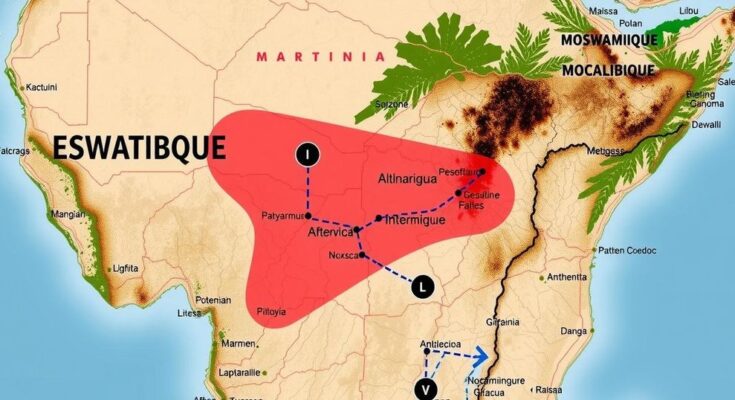South Africa has shifted trade and travel from its Leebombo Border Post to Eswatini’s Mananga Border Post due to rising violence following Mozambique’s disputed elections. Despite efforts from authorities, the situation presents challenges as political analysts see hope in potential dialogues. Concerns grow over regional stability and economic development amidst escalating unrest and lethal protests.
In response to escalating violence and political unrest in Mozambique following a contentious national election, South Africa has redirected trade and travel from the Leebombo Border Post to Eswatini’s Mananga Border Post. This diversion, prompted by instability at the southern border, has made Mananga an essential passageway for those crossing from Mozambique. According to Michael Masiapato, commissioner of South Africa’s Border Management Authority, the ongoing situation poses considerable challenges despite the authorities’ efforts to maintain order, as military and police deployments do not cover every affected area. Amid these tensions, political analyst Solomon Mondlane expressed cautious optimism regarding external interventions aimed at fostering dialogue between Mozambique’s government and its opposition, while Levy Ndou cautioned that if the violence escalates, intervention by regional bodies such as the Southern African Development Community (SADC) may become necessary. With regional leaders expressing a willingness to engage diplomatically, the long-term stability of Mozambique remains at the forefront of discussions amidst growing concerns over security and economic implications.
Mozambique is currently entangled in a political crisis stemming from a disputed election characterized by violent protests and widespread unrest. With the election of Daniel Chapo under contentious circumstances, the political landscape in Mozambique has grown increasingly volatile, resulting in fatalities and an urgent call for stability. This development not only jeopardizes internal security but raises alarms over potential impacts on regional peace and economic development within Southern Africa. As tensions escalate, neighboring countries are being forced to navigate the fallout, particularly in terms of trade and travel disruptions as demonstrated by the rerouting to Eswatini.
In summation, the political turmoil in Mozambique poses significant challenges to trade and travel between South Africa and Mozambique, prompting rerouting to Eswatini. While local authorities are managing the crisis, the sporadic violence highlights the necessity for diplomatic engagement. Analysts are cautiously optimistic about potential dialogue facilitated by regional powers, particularly South Africa, in their effort to stabilize the situation. The active involvement of organizations like the SADC may be vital in ensuring long-term peace and security in the region.
Original Source: www.voanews.com




